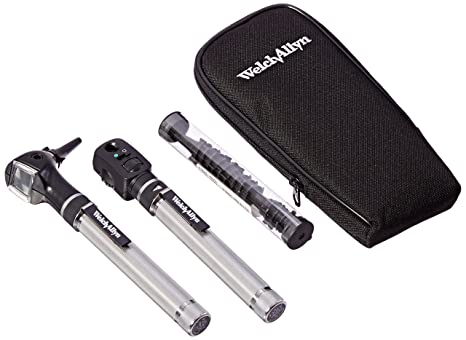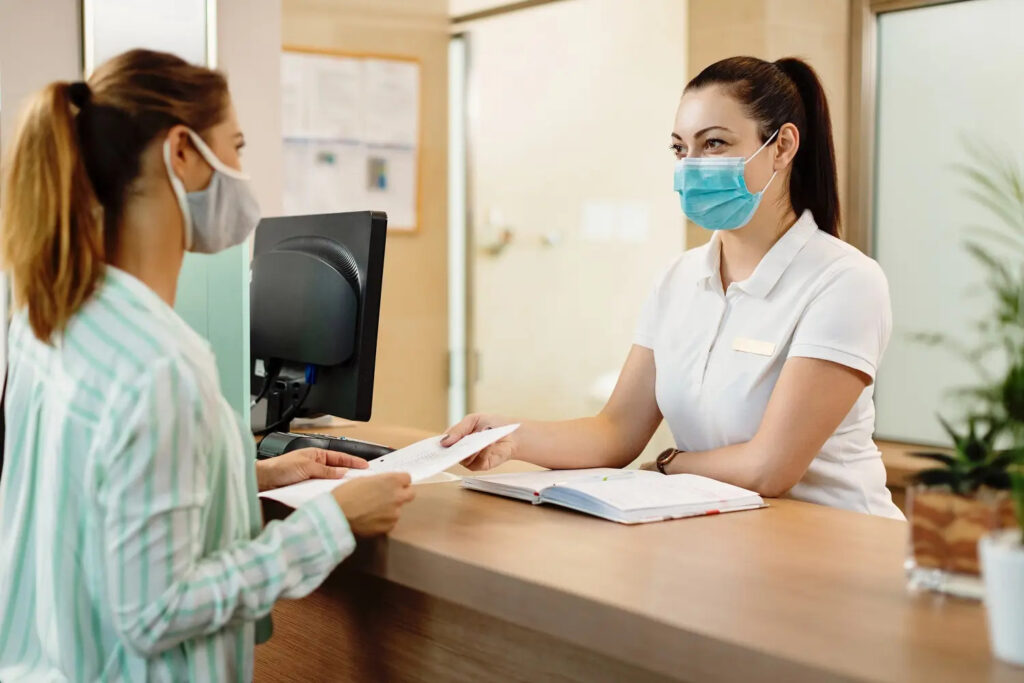In the ever-evolving field of healthcare, having the right diagnostic tools at your disposal can significantly impact patient care and outcomes. One such essential tool is the Welch Allyn Pocket Scope. This compact device combines an otoscope and an ophthalmoscope, making it an invaluable asset for healthcare professionals.
In this article we will discuss about “welch allyn pocket scope which tip is fit”.
What is the Welch Allyn Pocket Scope?

The Welch Allyn Pocket Scope is a portable diagnostic instrument that allows clinicians to perform quick examinations of the ears and eyes. Designed for ease of use and portability, it’s ideal for medical professionals on the go, whether in a clinic, hospital, or during home visits. The Pocket Scope’s lightweight design and compact size ensure that it can easily fit into a lab coat pocket, making it readily accessible when needed.
Why Choosing the Right Tip Matters?
Choosing the right tip for your Pocket Scope is crucial for several reasons:
- Diagnostic Accuracy: Different tips are engineered for specific examinations. Selecting the appropriate tip enhances your ability to conduct accurate assessments.
- Patient Comfort: Using the right-sized tip reduces discomfort for patients, especially in sensitive examinations involving children or those with anxiety.
- Versatility: A variety of tips allows healthcare professionals to address multiple diagnostic needs without carrying additional equipment.
Understanding these factors can help clinicians provide better care and improve patient experiences.
Types of Tips for the Welch Allyn Pocket Scope:
1. Otoscope Tips:
Otoscope tips are designed for ear examinations. They come in various sizes to cater to different patient populations.
- Adult Tips: These larger tips are used for adults, providing a clear view of the ear canal and tympanic membrane. The design facilitates easy insertion and minimizes discomfort.
- Pediatric Tips: Smaller in size, pediatric otoscope tips are specifically designed for children. They ensure a snug fit in smaller ear canals, which helps to reduce anxiety and discomfort during the examination.
- Speculum Type: Welch Allyn also offers disposable specula that can be used for otoscopic examinations. These ensure hygiene and reduce the risk of cross-contamination.
2. Ophthalmoscope Tips:
Ophthalmoscope tips are crucial for eye examinations, enabling clinicians to view the retina and other internal structures of the eye.
- Standard Tips: These tips provide a basic view and are sufficient for routine eye examinations. They are typically compatible with a variety of Pocket Scope models.
- Specialty Lenses: For more detailed examinations, specialty ophthalmoscope tips are available. These include different lens types that offer various magnifications and fields of view, assisting in diagnosing conditions like diabetic retinopathy, glaucoma, and macular degeneration.
3. Specialty Tips:
In addition to standard otoscope and ophthalmoscope tips, Welch Allyn offers other specialty tips for various examinations.
- Nasal Examination Tips: These tips are designed to facilitate examinations of the nasal passages. Their unique shape allows for easy access and visibility, making it easier to diagnose conditions such as sinusitis or nasal polyps.
- Throat Examination Tips: Some tips are tailored for examining the throat, providing an unobstructed view of the oropharynx. These tips are especially useful in diagnosing throat infections and other related conditions.
How to Choose the Right Tip:

Selecting the appropriate tip for your Welch Allyn Pocket Scope involves several considerations:
1. Patient Demographics:
Understanding your patient population is crucial:
- Adults vs. Children: For adult patients, standard tips are typically sufficient. However, when working with children, always opt for pediatric tips to ensure comfort and ease of use.
- Specific Conditions: If you’re examining patients with specific conditions (e.g., diabetes), specialty ophthalmoscope tips may be necessary to provide the detailed views required for accurate diagnosis.
2. Examination Type:
Identify the primary types of examinations you will be performing:
- Routine vs. Specialized Exams: For general practice, a basic otoscope and ophthalmoscope tip may suffice. If your practice involves specialized fields such as pediatrics or ophthalmology, consider investing in a broader range of specialty tips.
3. Compatibility and Quality:
- Model Matching: Ensure that the tips you choose are compatible with your specific model of the Welch Allyn Pocket Scope. Refer to the product manual or manufacturer’s website for guidance.
- Quality Considerations: Welch Allyn is renowned for its high-quality medical instruments. Investing in authentic tips will ensure reliability and durability, contributing to better patient care.
Benefits of Using the Welch Allyn Pocket Scope:
The Welch Allyn Pocket Scope offers numerous benefits, making it a top choice for healthcare professionals:
- Portability: Its compact design makes it easy to carry, ensuring that you have the necessary tools at your fingertips when needed.
- Versatility: With multiple tips available, the Pocket Scope can be used for a wide range of examinations, minimizing the need for extra equipment.
- High Quality and Reliability: Welch Allyn is synonymous with quality in the medical field. Their products are designed to withstand the rigors of everyday use, ensuring longevity and dependability.
- User-Friendly Design: The Pocket Scope is designed for ease of use, allowing healthcare providers to focus more on patient care rather than struggling with their tools.
FAQ’s:
1. What are the main types of tips available for the Welch Allyn Pocket Scope?
The main types of tips available for the Welch Allyn Pocket Scope include otoscope tips (for ear examinations), ophthalmoscope tips (for eye examinations), and specialty tips for nasal and throat examinations. Each type comes in various sizes to cater to different patient demographics, such as adults and children.
2. How do I know which otoscope tip to use for children?
For children, it is recommended to use pediatric otoscope tips. These tips are smaller in size, designed to fit comfortably in a child’s ear canal, which helps minimize discomfort and anxiety during the examination.
3. Are the tips for the Welch Allyn Pocket Scope interchangeable with other models?
It’s essential to ensure compatibility when selecting tips. While some tips may fit multiple models, it’s best to refer to the product manual or the manufacturer’s website to confirm that the tips you choose are compatible with your specific Welch Allyn Pocket Scope model.
4. Can I use disposable tips with the Welch Allyn Pocket Scope?
Yes, Welch Allyn offers disposable specula for otoscopic examinations. Using disposable tips helps maintain hygiene and reduces the risk of cross-contamination between patients, making them a practical choice in clinical settings.
5. What should I consider when selecting specialty ophthalmoscope tips?
When selecting specialty ophthalmoscope tips, consider the specific conditions you need to diagnose. Specialty tips may provide various magnifications and fields of view, which can be crucial for identifying conditions like diabetic retinopathy or glaucoma.
Conclusion:
In summary, choosing the right tip for your Welch Allyn Pocket Scope is essential for effective patient examinations and overall care. By understanding the various options available and their specific applications, you can ensure that you are well-equipped to handle a range of diagnostic needs. Whether you are examining the ears, eyes, or other areas, having the right tools makes a significant difference in patient outcomes.
Related Post
- Does Planet Fitness Have Weight Scales – Here’s What You Need to Know!
- Does La Fitness Provide Towels – Everything You Need to Know Before Hitting the Gym!
- Does 24 Hour Fitness Have A Swimming Pool – Everything You Need to Know!
- Did Planet Fitness Donate To Trump – A Deep Dive into Politics, Perception & Public Reaction!
- Can You Wear Crocs To Planet Fitness – A Complete Guide!